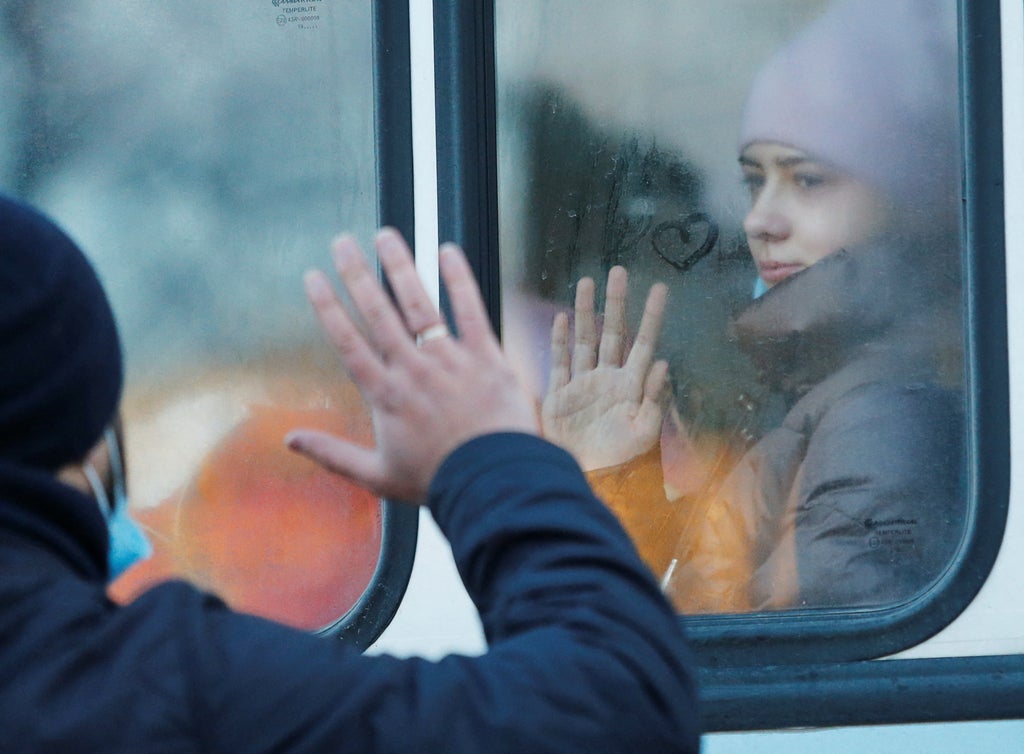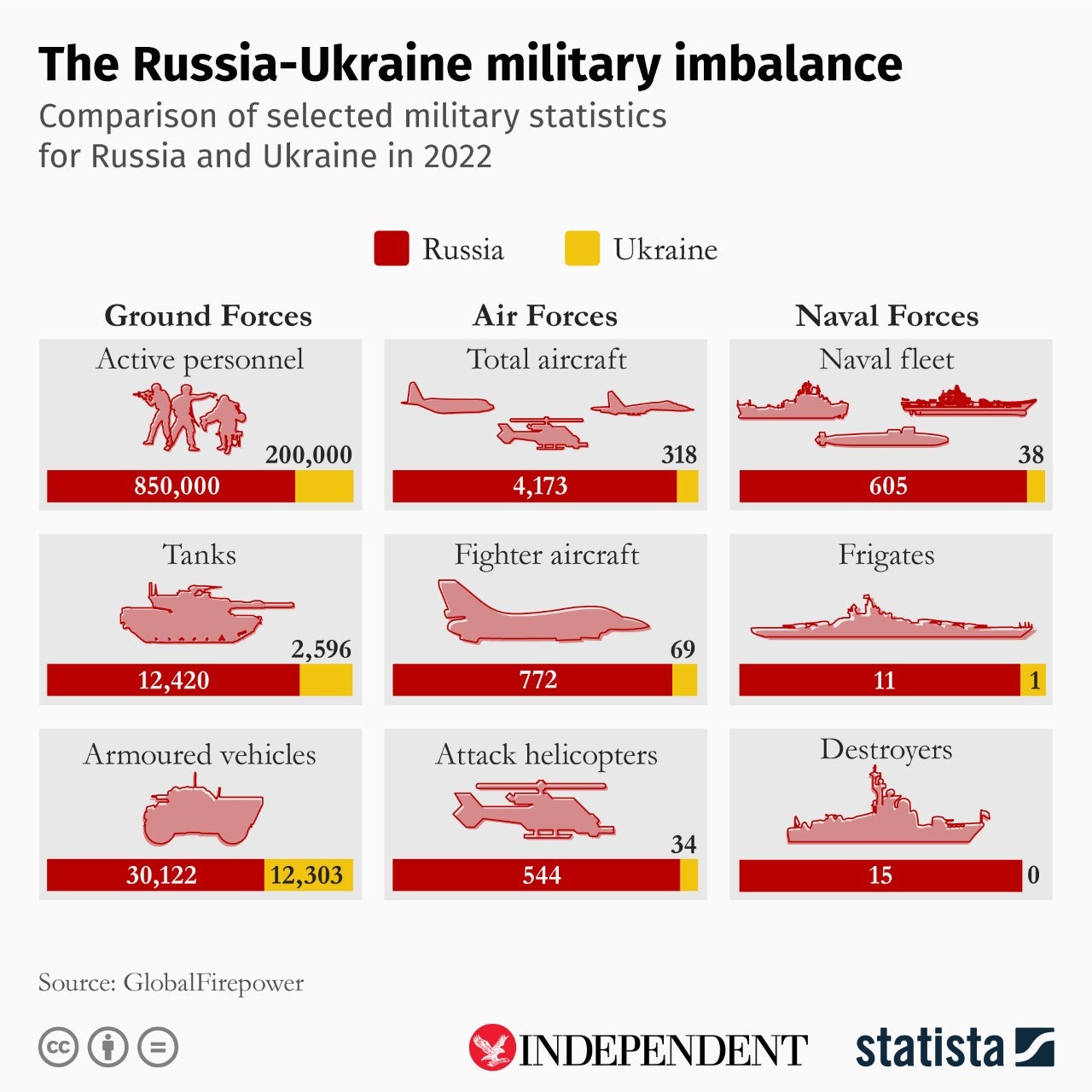
After weeks of rising tensions between Russia and Ukraine over Moscow’s build-up of military forces along its western border with its neighbour, matters appear to be coming to a head.
Shelling has intensified in recent days in eastern Ukraine along a long-simmering frontline between Russia-backed separatists and Ukrainian forces, while western leaders and officials have issued repeated warnings that an invasion is likely to happen in a matter of days.
The UK has seen intelligence that suggests Vladimir Putin’s plan to invade Ukraine is already underway, Downing Street said on Tuesday, echoing a similar warning by US vice president Kamala Harris on Saturday.
On Monday, Mr Putin formally recognised two eastern Ukrainian regions held by pro-Russian separatist groups as independent states.
Denis Pushilin and Leonid Pasechnik, leaders of the self-proclaimed Donetsk People’s Republic (DPR) and Luhansk People’s Republic (LPR) respectively, made a direct appeal to the Kremlin and asked for military and financial aid as the situation in those regions became increasingly critical.
The Russian leader duly informed his security council that it was necessary that their appeals be considered seriously.
Mr Putin was told by his predecessor, Dmitry Medvedev, now deputy chairman of the council, that he believes a majority of Russians would support the two regions’ independence claims, adding that around 800,000 Russian citizens live in the DPR and LPR.
Recognition of their status as independent states swiftly followed, giving Mr Putin a pretext to send troops across the border while arguing that he was doing so to protect the breakaway regions as fellow allies against Kiev.
The international community immediately hit out at the decision, with the United Nations Security Council expressing “great concern”.
Vassily Nebenzia, the Russian ambassador to the UN, insisted there would be no “new bloodbath” in eastern Ukraine but warned the West to “think twice” before making matters worse.
“We remain open to diplomacy for diplomatic solution,” he said. “However, allowing bloodbath in Donbas is something we don’t intend to do. We are forced to note the negative role played by our western colleagues led by the US.”

UK defence secretary Ben Wallace has said that the situation is now “incredibly serious”, adding: “This is a sovereign state which has now had some of its land effectively annexed from it.”
UK prime minister Boris Johnson has already promised that Russia will face a “barrage of sanctions”, with the US and EU expected to take similar actions as a deterrent.
Equally strong in his condemnation was European commissioner for justice Didier Reynders, who called it an “act of war”, likewise saying that sanctions would be “necessary to ensure that there are no more imports of goods or services from Russia, such as energy, and that Russia’s global access to financial services is terminated.”
Germany has meanwhile moved to block the regulatory approval of the Nord Stream 2 natural gas pipeline linking it to Russia via the Baltic Sea as a penalty for the aggression.
Russian foreign secretary Sergey Lavrov has so far dimissed the reaction, declaring: “Our European, American, British colleagues will not stop and will not calm down until they have exhausted all their possibilities for the so-called ‘punishment of Russia’. They are already threatening us with all manner of sanctions or, as they say now, ‘the mother of all sanctions’.
“Well, we’re used to it. We know that sanctions will be imposed anyway, in any case. With or without reason.”
Both the DPR and LPR declared their independence on 12 May 2014 after Mr Putin annexed the Crimean Peninsula in response to his preferred pro-Moscow presidential candidate, Viktor Yanukovych, having been driven from power by mass protests.
An estimated 14,000 people have been killed in the ongoing conflict in the region over the last eight years, with Nato and Ukraine accusing Russia of arming the separatist rebels, a charge the Kremlin denies.
The DPR and LPR are officially considered terrorist organisations by Kiev, although that is not a designation agreed upon by the US, EU or other international bodies.
Their previous leaders, Alexander Zakharchenko and Igor Plotnitsky, were signatories to the Minsk agreements of 2014 and 2015, which were forged in the hope of ending the violence but which were never enacted because of differing interpretations of the accords.
Russia insisted that it was not a party to the conflict and that the agreement therefore did not apply to it, arguing that it could not remove armed forces and military hardware from Donetsk and Luhansk because the combatants were part of a separatist insurgency and not its own.
Both sides continued to disagree, with Ukraine viewing the Minsk accords as a means by which it could re-establish control over its border while Russia saw them as a chance to grant autonomy to the rebel territories, effectively giving it a voice in Ukrainian foreign policy by proxy.
The prospect of elections in the Donbas industrial heartland that houses the DPR and LPR was also controversial given that they raised the possibility of former separatist warlords sitting in parliament or winning high office within the police, an outcome regarded as intolerable by many Ukrainians.







